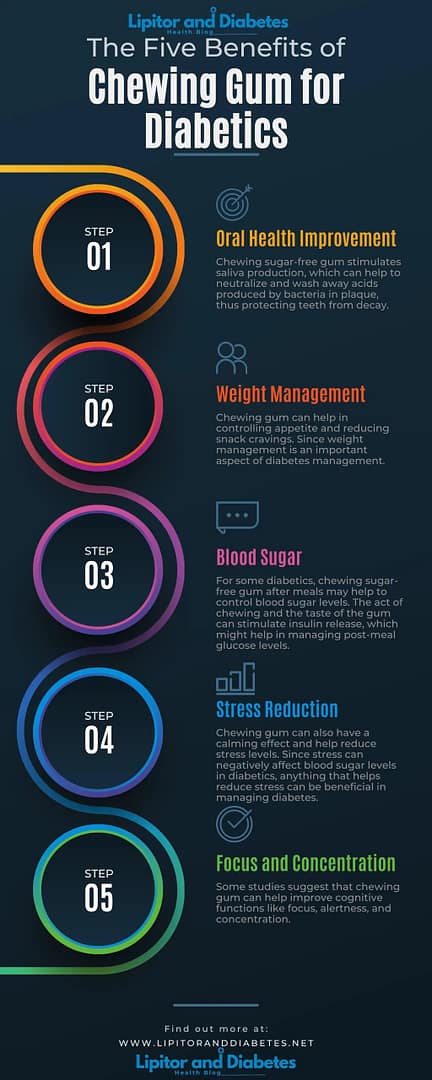Did you know that over 30 million people in the United States have diabetes? Managing blood sugar levels is a constant challenge for individuals with diabetes, and every aspect of their diet can make a difference. One seemingly innocent item that diabetics may wonder about is chewing gum. Can diabetics safely indulge in chewing gum? And if so, what are the best options for them?
Key Takeaways:
- Sugar-free gum is typically the best choice for diabetics as it does not impact blood sugar levels.
- Natural sweeteners like xylitol and stevia are preferred over artificial sweeteners in gum for diabetics.
- Chewing gum can provide oral health benefits, stress relief, and promote saliva production.
- Top sugar-free gum options for diabetics include PUR 100% Xylitol Gum and Stevita SteviaDent Sugar-Free Gum.
- It’s important to practice moderation in gum consumption and choose gum that aligns with individual dietary needs.
The Benefits of Chewing Gum for Diabetics
Chewing gum offers numerous benefits for individuals with diabetes. Not only can it improve oral health, but it also provides stress relief and emotional stability. Additionally, certain gum options made with natural sweeteners like xylitol can contribute to dental health by preventing tooth decay and gum diseases.

1. Improved Oral Health
Chewing gum stimulates saliva production, which plays a crucial role in maintaining oral health. Increased saliva helps remove food debris and neutralize acids in the mouth, reducing the growth of bacteria that can lead to cavities and gum diseases.
2. Stress Relief and Emotional Stability
Chewing gum has been found to have a calming effect and can help alleviate stress and anxiety. The rhythmic motion of chewing can promote relaxation and provide a sense of emotional stability, making it a convenient and accessible way to manage stress.
3. Dental Health Benefits
Gum options made with natural sweeteners like xylitol can contribute to dental health. Xylitol has been shown to prevent the growth of bacteria that cause cavities and gum diseases. Regularly chewing xylitol gum can help maintain a healthy mouth and reduce the risk of dental issues.
“Chewing gum offers numerous benefits for individuals with diabetes. Not only can it improve oral health, but it also provides stress relief and emotional stability.”
In summary, chewing gum provides several advantages for individuals with diabetes. It promotes oral health by increasing saliva production, offers stress relief, and contributes to emotional stability. Additionally, gum options made with natural sweeteners like xylitol can help maintain dental health. Incorporating sugar-free gum into the daily routine can be a convenient and enjoyable way to support overall well-being for those living with diabetes.
Choosing the Right Chewing Gum for Diabetics
When it comes to chewing gum for diabetics, selecting the right option is crucial. Sugar-free gum is the way to go, as it doesn’t contain any sugars that can affect blood sugar levels. However, not all sugar-free gums are created equal. It’s important to look for gum that is sweetened with natural alternatives like xylitol or stevia, as these sweeteners do not impact blood sugar levels.
Gums sweetened with artificial sweeteners may pose potential health risks, so it’s best to avoid them. Opting for natural sweeteners in your gum choice can provide a healthier alternative, ensuring you can enjoy the benefits of chewing gum without compromising your health and blood sugar management.
Take a moment to familiarize yourself with the various sugar-free gum options available, paying close attention to ingredient labels and sweetener choices. By selecting gum that is free from artificial sweeteners and rich in natural alternatives, you can enjoy a satisfying chewing experience while keeping your blood sugar levels in check.
Top Sugar-Free Gum Options for Diabetics
When it comes to choosing the right gum for diabetics, sugar-free options are the way to go. Thankfully, there are several top-quality sugar-free gum brands available that cater specifically to the needs of diabetics. These gums are sweetened with natural alternatives like xylitol or stevia, offering a safe and enjoyable chewing experience without compromising blood sugar levels or oral health.
Here are some popular sugar-free gum options that diabetics can consider:
| Gum Brand | Sweetener | Flavor |
|---|---|---|
| PUR 100% Xylitol Gum | Xylitol | Assorted flavors |
| Xylichew 100% Xylitol Chewing Gum | Xylitol | Peppermint, spearmint |
| Spry Fresh Natural Xylitol Chewing Gum | Xylitol | Assorted flavors |
| Stevita SteviaDent Sugar-Free Gum | Stevia | Peppermint |
| Happy ECO Natural Spearmint Chewing Gum | Xylitol, stevia | Spearmint |
These gum brands prioritize the use of natural sweeteners, ensuring a guilt-free indulgence while maintaining optimal blood sugar levels. They are free from sugars, artificial chemicals, and harmful additives that can be found in conventional gum products. The diverse range of flavors provides options to suit individual preferences, whether it’s refreshing peppermint or invigorating spearmint.
It’s important to note that the table above provides a brief comparison of some popular sugar-free gum options for diabetics. However, it’s always recommended to review the ingredient list and consult with a healthcare professional before including any new product in your diet.
Next, I will explore the specific health benefits of xylitol gum for diabetics, shedding light on its impact on dental health, blood sugar management, and overall well-being.
The Health Benefits of Xylitol Gum
Xylitol gum offers numerous health benefits, making it an excellent choice for diabetics looking to improve their dental health and manage blood sugar levels. This sugar-free gum not only provides a refreshing and enjoyable chewing experience but also promotes various oral health benefits.
Dental Health: Xylitol gum plays a crucial role in cavity prevention by inhibiting the growth of harmful bacteria in the mouth. The natural sweetener xylitol disrupts the bacteria’s ability to adhere to the teeth, reducing the risk of dental decay and cavities. Regular chewing of xylitol gum stimulates saliva production, which helps to neutralize acids in the mouth and remineralize enamel, further strengthening and protecting the teeth.
Gum Disease Prevention: Xylitol gum also aids in gum disease prevention. By reducing plaque build-up on the gumline, it minimizes the risk of gingivitis and periodontal disease. Regular chewing of xylitol gum can help maintain healthy gums and overall oral hygiene.
Saliva Production: Another notable benefit of xylitol gum is its ability to stimulate saliva production. Saliva is essential for maintaining oral health as it helps to wash away food particles, neutralize acids, and promote a healthy balance of oral bacteria. Diabetics may also benefit from increased saliva production as it can help prevent dry mouth, a common side effect of certain medications used to manage diabetes.
Xylitol Gum Benefits
| Benefits | Description |
|---|---|
| Cavity Prevention | Xylitol gum inhibits the growth of bacteria and prevents dental decay. |
| Enamel Remineralization | Regular chewing of xylitol gum promotes the remineralization of enamel, strengthening the teeth. |
| Gum Disease Prevention | Xylitol gum reduces plaque build-up and lowers the risk of gingivitis and gum disease. |
| Saliva Production | Chewing xylitol gum stimulates saliva production, maintaining oral health and preventing dry mouth. |
Overall, the health benefits of xylitol gum make it a valuable tool for diabetics seeking to prioritize their dental health while effectively managing blood sugar levels.
The Advantages of Stevia Gum for Diabetics
Stevia gum offers several advantages for diabetics, making it a great option to consider. One of the key benefits is that stevia gum does not affect blood sugar levels, making it safe for individuals managing diabetes. This is particularly important for maintaining stable blood sugar regulation throughout the day.
Moreover, stevia gum can be a useful tool for weight management. As it contains zero calories, it can be enjoyed guilt-free as a sugar-free alternative to traditional gum varieties. By choosing stevia gum, individuals can satisfy their sweet cravings without compromising their calorie intake.
Another significant advantage of stevia gum is its contribution to dental health. Like other sugar-free gum options, stevia gum promotes saliva production, which helps cleanse the mouth of food debris and reduce the growth of harmful bacteria. By chewing stevia gum regularly, diabetics can support their dental hygiene and prevent potential oral health issues.
To summarize, stevia gum offers multiple benefits for diabetics. It does not affect blood sugar levels, making it suitable for blood sugar regulation. It can aid in weight management due to its calorie-free nature. Additionally, it contributes to dental health by promoting saliva production. Incorporating stevia gum into your daily routine can be an excellent choice for overall well-being.
| Advantages of Stevia Gum for Diabetics |
|---|
| Does not affect blood sugar levels |
| Supports weight management as calorie-free gum |
| Promotes dental health through increased saliva production |
The Importance of Avoiding Artificial Sweeteners in Gum
As a diabetic, it is crucial to be mindful of the ingredients in the chewing gum you consume. Artificial sweeteners, commonly found in gum, can pose potential health risks. These sweeteners, such as aspartame, acesulfame-K, neotame, and saccharin, have been associated with various health issues and may not be suitable for individuals with diabetes.
Artificial sweeteners have been a topic of debate, with studies suggesting potential negative effects on health. Some research links these sweeteners to metabolic disturbances, weight gain, and even an increased risk of diabetes. While the evidence is not conclusive, it is essential to err on the side of caution when it comes to your health.
When choosing gum, opt for products sweetened with natural alternatives. These can include natural sweeteners like xylitol or stevia. Not only are these sweeteners a safer choice for diabetics, but they also offer additional benefits. Xylitol, for example, can help prevent tooth decay and promote dental health.
“Choosing gum sweetened with natural alternatives like xylitol or stevia is a smarter choice for diabetics, minimizing potential health risks while still enjoying the benefits of chewing gum.”
By avoiding gum that contains artificial sweeteners and opting for natural alternatives, you can prioritize your health while still enjoying the benefits of chewing gum.
Benefits of Natural Sweeteners in Gum
Gums sweetened with natural alternatives like xylitol or stevia offer a range of advantages:
- Safe for diabetics: Natural sweeteners do not affect blood sugar levels, making them suitable for individuals with diabetes.
- Dental health: Natural sweeteners like xylitol can help prevent tooth decay, promote saliva production, and maintain good oral health.
- Reduced health risks: By avoiding artificial sweeteners, you minimize potential negative effects on your overall health.
When it comes to your health, it’s important to make informed choices. By selecting gum sweetened with natural alternatives, you can enjoy the benefits of chewing gum without compromising your well-being.
| Gum | Sweetener |
|---|---|
| PUR 100% Xylitol Gum | Xylitol |
| Xylichew 100% Xylitol Chewing Gum | Xylitol |
| Spry Fresh Natural Xylitol Chewing Gum | Xylitol |
| Stevita SteviaDent Sugar-Free Gum | Stevia |
| Happy ECO Natural Spearmint Chewing Gum | Xylitol |
These gum options are excellent choices for diabetics as they are sweetened with natural alternatives and do not contain artificial sweeteners.
The Impact of Gum on Blood Sugar Levels
When it comes to blood sugar management, individuals with diabetes need to carefully consider the foods and beverages they consume. However, when it comes to chewing gum, the impact on blood sugar levels is generally minimal, especially when choosing sugar-free options. Sugar alcohols, such as xylitol, maltitol, and erythritol, commonly used as sweeteners in sugar-free gum, have a low glycemic index and do not significantly affect blood glucose levels.
Sugar alcohols are carbohydrates that are incompletely absorbed by the body, resulting in a reduced impact on blood sugar levels. They provide a sweet taste without the metabolic consequences of traditional sugars. While sugar alcohols do provide some calories, they have fewer calories per gram compared to regular sugar.
Xylitol, in particular, is a sugar alcohol that has gained popularity in sugar-free gum due to its dental health benefits and minimal impact on blood sugar levels. Studies have shown that xylitol can help prevent tooth decay by reducing the growth of harmful bacteria in the mouth and promoting saliva production, which helps remineralize tooth enamel.
Here is a comparison of the glycemic index and calories per gram for commonly used sugar alcohols:
| Sugar Alcohol | Glycemic Index | Calories per Gram |
|---|---|---|
| Xylitol | 7 | 2.4 |
| Maltitol | 36 | 2.1 |
| Erythritol | 0 | 0.2 |
As shown in the table, sugar alcohols have a lower glycemic index compared to regular sugar, indicating a slower and lesser impact on blood sugar levels. They also have lower calorie content, making them a suitable option for individuals managing diabetes and looking to maintain stable blood sugar levels.
It’s important for individuals with diabetes to choose sugar-free gum that uses sugar alcohols as sweeteners, like xylitol, maltitol, or erythritol. These sugar alcohols provide a sweet taste without causing significant spikes in blood glucose levels. However, it’s essential to note that consuming excessive amounts of sugar alcohols can have a laxative effect and cause digestive discomfort. Therefore, moderation is key when it comes to enjoying sugar-free gum as part of a diabetic-friendly lifestyle.
The Role of Chewing Gum in Oral Hygiene for Diabetics
Chewing gum plays a beneficial role in oral hygiene for diabetics. Not only does it freshen breath, but it also offers additional advantages that contribute to overall dental health. Regular gum chewing can help remove plaque and bacteria from the teeth and gums, reducing the risk of dental problems.
One of the key benefits of chewing gum is its ability to promote saliva production. Saliva plays a crucial role in oral health as it helps wash away food debris and neutralize acids in the mouth. This natural defense mechanism also aids in reducing the growth of bacteria that can cause tooth decay and gum diseases.
For diabetics, maintaining good gum health is vital as they may be more susceptible to oral health issues. The elevated blood sugar levels associated with diabetes can weaken the body’s ability to fight off infections, including those affecting the gums. By incorporating regular gum chewing into their oral hygiene routine, diabetics can help strengthen their gums and reduce the risk of gum diseases.
In addition to promoting gum health and plaque removal, chewing gum can also prevent dry mouth, a common issue that diabetics may experience. Dry mouth occurs when there is a lack of saliva production, leading to discomfort and an increased risk of dental problems. Chewing gum stimulates saliva flow, helping to alleviate dry mouth symptoms and maintain oral moisture levels.
To make the most of the oral hygiene benefits of chewing gum, diabetics should choose sugar-free options that are sweetened with natural alternatives like xylitol or stevia. These sweeteners do not affect blood sugar levels and provide a healthier choice compared to gum containing artificial sweeteners. It’s important to read the ingredient label carefully and opt for gum that is free from harmful chemicals.
“Chewing gum can be a simple yet effective addition to the oral hygiene routine of diabetics. It can help remove plaque, reduce bacteria, promote gum health, and prevent dry mouth.”
Overall, chewing gum offers diabetics a convenient and beneficial way to maintain good oral hygiene. By incorporating regular gum chewing into their daily routine, diabetics can enjoy the advantages of plaque removal, bacteria reduction, improved gum health, and dry mouth prevention.
The Importance of Moderation in Chewing Gum Consumption
While chewing gum can offer benefits for diabetics, it’s essential to consume it in moderation. Excessive consumption of xylitol-sweetened gum, in particular, can have a laxative effect and cause digestive discomfort. It’s recommended to consume gum in moderation, following the recommended serving size. If any digestive issues occur, it’s best to reduce or eliminate gum consumption.
| Gum Brand | Serving Size | Effects on Digestion |
|---|---|---|
| PUR 100% Xylitol Gum | 1 piece | No reported issues |
| Xylichew 100% Xylitol Chewing Gum | 2 pieces | No reported issues |
| Spry Fresh Natural Xylitol Chewing Gum | 1 piece | No reported issues |
| Stevita SteviaDent Sugar-Free Gum | 2 pieces | No reported issues |
| Happy ECO Natural Spearmint Chewing Gum | 1 piece | No reported issues |
Consuming xylitol gum in moderation is crucial to avoid the unwanted laxative effect. Each brand specifies the recommended serving size, which should be followed to prevent any digestive discomfort. If you experience any issues, such as diarrhea or an upset stomach, it’s advisable to reduce or eliminate gum consumption and consult a healthcare professional if necessary.
Remember, moderation is the key to enjoying the benefits of chewing gum without any negative effects on your digestive system.
Tips for Choosing and Using Chewing Gum for Diabetics
When it comes to selecting and using chewing gum for diabetics, there are a few key factors to consider. By keeping these tips in mind, you can make informed choices that align with your dietary needs and oral hygiene habits. Let’s explore some essential guidelines:
Gum Selection
- Choose gum that is sugar-free and free from artificial sweeteners. Reading the ingredient label is crucial to ensure the gum is diabetic-friendly.
- Opt for gum sweetened with natural alternatives like xylitol or stevia, as these do not impact blood sugar levels.
Ingredient Label Reading
Always read the ingredient label carefully before purchasing chewing gum. Look out for any hidden sugars or artificial sweeteners, such as aspartame, acesulfame-K, neotame, or saccharin. By being mindful of the ingredients, you can select gum that is safe for diabetics.
Portion Control
Practice portion control when chewing gum. It’s essential to follow the recommended serving size to avoid excessive consumption. Overindulging in xylitol-sweetened gum, in particular, can have a laxative effect and cause digestive discomfort.
Oral Hygiene Habits
Incorporating gum chewing into your oral hygiene habits can lead to improved dental health. Chew gum after meals to help remove food debris and promote saliva production. Saliva plays a crucial role in maintaining oral health by washing away bacteria and neutralizing acids that can attack tooth enamel.
Regular chewing of sugar-free gum can be a beneficial addition to your oral hygiene routine, as long as you choose the right gum and practice moderation in consumption.
To summarize, choosing and using chewing gum for diabetics requires careful consideration. Opt for sugar-free gum with natural sweeteners, read ingredient labels to avoid harmful additives, practice portion control, and incorporate gum chewing into your oral hygiene habits. By following these tips, you can enjoy the benefits of chewing gum while managing your blood sugar levels and maintaining good oral health.
Conclusion
Chewing gum can be a valuable addition to the lifestyle of diabetics, offering benefits for oral health and blood sugar management. When choosing gum, it is crucial to opt for sugar-free options that are free from artificial sweeteners. Instead, look for gums sweetened with natural alternatives like xylitol or stevia, which do not impact blood sugar levels.
Incorporating sugar-free gum into your daily routine can contribute to improved oral hygiene by increasing saliva production, reducing plaque and bacteria, and preventing dry mouth. Additionally, chewing gum can potentially aid in blood sugar management for diabetics. Remember to consume gum in moderation, following the recommended serving size, and be mindful of xylitol-sweetened gum’s potential laxative effect.
By choosing the right chewing gum and incorporating it into your oral hygiene habits, you can enjoy the benefits of enhanced dental health while potentially managing blood sugar levels. Take control of your oral health and blood sugar management by incorporating sugar-free gum into your lifestyle as a diabetic.
FAQ
Is sugar-free gum safe for diabetics to chew?
What are the benefits of chewing gum for diabetics?
What should I look for when choosing chewing gum for diabetes?
What are some sugar-free gum options for diabetics?
What are the health benefits of xylitol gum for diabetics?
What are the advantages of stevia gum for diabetics?
Why should diabetics avoid gum with artificial sweeteners?
Does chewing gum have an impact on blood sugar levels?
How does chewing gum contribute to oral hygiene for diabetics?
What is the importance of moderation in chewing gum consumption?
What are some tips for choosing and using chewing gum for diabetics?
Any final thoughts on chewing gum for diabetics?
Source Links
- https://diabeticme.org/diabetes-products/diet/the-best-chewing-gum-for-diabetics/
- https://www.newleafrp.com/blog/xylitol-chewing-gum-is-it-safe/
- https://www.thediabetescouncil.com/can-diabetics-chew-sugar-free-gum/


